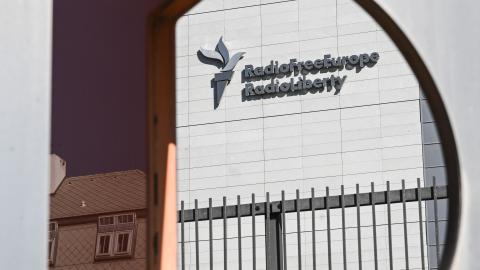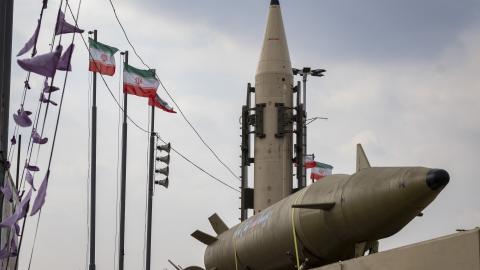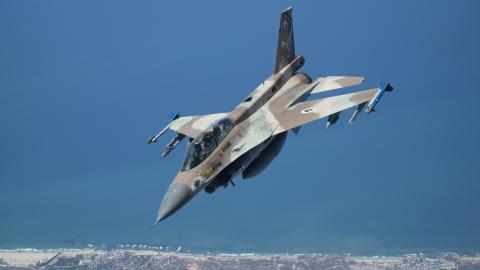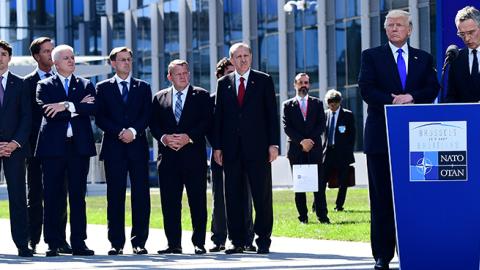After all the worry over President Trump's criticisms of the NATO alliance, it certainly looks like he is making the alliance significantly stronger.
The president landed in Brussels on Wednesday, kicking off the last leg of his first international trip as president.
The president will continue to meet with European leaders to discuss a variety of issues. But President Trump's priorities will be combatting Islamist terrorism and securing NATO's official commitment to become a much more active partner in that effort.
A corollary of this, of course, is urging individual NATO countries to up their financial contributions to meet the security needs of the alliance.
After remarks during the campaign doubting the contributions of NATO to the security of the United States (that's why each member nation is part of the alliance, right? For its own security?) Trump administration officials including Vice President Mike Pence, secretaries of State and Defense Tillerson and Mattis, and ambassador to the United Nations Nikki Haley, have reiterated the U.S. commitment to the alliance, and in particular, Article V, the mechanism that requires each member nation to come to the defense of any and all other members should they be attacked.
Since becoming president, Trump has signaled he is looking more favorably on NATO.
But claims that the president merely had a knowledge deficit and has only now learned to appreciate NATO don’t have it exactly right. It isn't the president who has changed, at least, not in principle. NATO allies have changed. And that has had the effect of changing the president’s mind on the policy.
Trump seems not to have been opposed to NATO in principle. He was (and is) opposed to alliances that to his mind do not further the security of Americans.
But if NATO allies recommit to the purpose of the alliance, prove it by prioritizing meeting the two percent of GDP minimum for defense spending, and get much more serious about helping in the counter-terrorism campaign, the alliance will be an even greater asset to international stability, relax some of the burden on Americans in precious blood and treasure, and increase the security of Americans.
For all the criticism Trump has received about his demands for most NATO allies to contribute more (only the United States, Greece, the United Kingdom, Estonia, and Poland meet the two percent minimum), previous presidents, including President Obama, made those same demands.
But now allies are finally responding and are already committing more money. NATO Secretary General Jens Stoltenberg said in a
joint press conference with President Trump, “In 2016, for the first time in many years, we saw an increase in defense spending across European Allies and Canada. A real increase of 3.8 percent. Or $10 billion dollars more for our defense.” It’s reasonable to expect more. And as much as the alliance has contributed to the war against Islamist terrorists since 9/11, we can expect more help there, too.
So what's different?
Allies are taking President Trump's demands on the alliance seriously-- deadly seriously.
NATO allies, particularly Russia's closest neighbors, need the alliance for their very survival. Russia continues to threaten Poland and the Baltic states, and to deter Russian aggression, there must be a strong show of NATO solidarity, most importantly, American solidarity with NATO.
No doubt NATO will get that from the American president Thursday, and Americans will be the beneficiaries of a more stable Europe and a rejuvenated international coalition to seek and destroy Islamist extremists.
Allies are learning something that's taking the American media a long time to understand.
Donald Trump does not care about theory, about globalism, or about "the way we’ve always done it.” He is a man of action and results.
Just like every other nation's leader, President Trump is doggedly committed to fighting for his own country's interests.
The question he seems to ask when approaching agreements and treaties is: does this help the United States of America? The only answer that will do is “yes,” and then he demands proof of the benefit.
Has the president's calling into question NATO's contemporary usefulness been uncomfortable and, especially to vulnerable allies, unnerving? Undoubtedly.
But every good negotiator knows the one willing to walk away from the deal is the one who truly gets to set the terms. (Just ask Iran about President Obama’s Iran deal.)
And President Trump's approach to NATO looks to be resulting in very good things for the United States of America: a stronger, new and improved NATO that will be excellent for all of its members.















